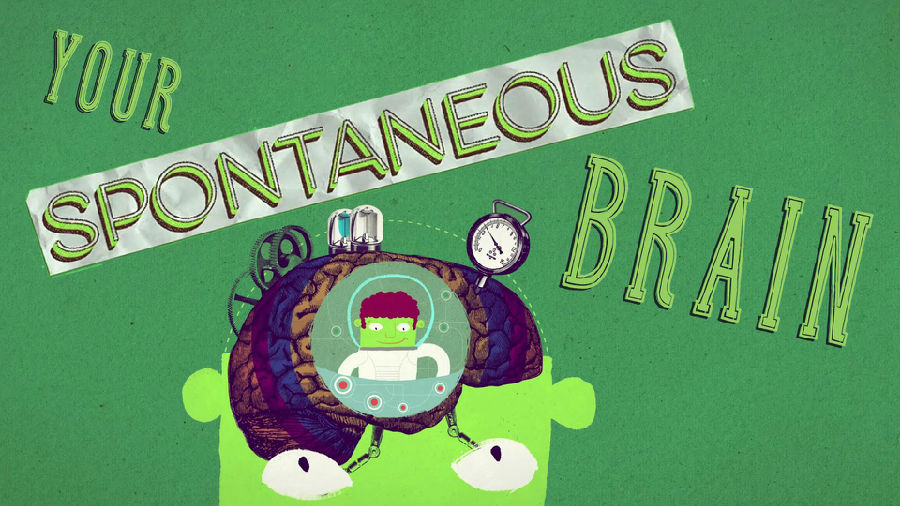(单词翻译:单击)
You probably don't need to be told how important your brain is.
关于大脑的重要性,我想你一定已经知道了。
After all, every single thing you experience, your thoughts and your actions,
不管怎样,你经历过的任何事情,任何想法和行动,
your perceptions and your memories are processed here in your body's control center.
任何感知和记忆,都是在你身体的这个控制中心中被处理的。
But if this already seems like a lot for a single organ to handle,
尽管看上去对于一个豆腐一样的器官来说,这已经是很多工作了,
it's actually only a small part of what the brain does.
但是实际上,这只是大脑工作的一小部分。
Most of its activities are ones you'd never be aware of, unless they suddenly stopped.
大脑真正大量的活动,实际上是那些我们没有意识到的部分,除非它突然停止工作。
The brain is made up of billions of neurons, and trillions of connections.
大脑是由上百计脑神经元组成的,这上百亿神经元相互之间有上千亿连结。
Neurons can be activated by specific stimuli or thoughts, but they are also often spontaneously active.
每个神经元都能被特定的刺激或者想法激活,但是这些神经元通常也能自我激活。
Some fire cyclically in a set pattern.
有些神经元根据一些模式周期性“自我激活”。
Others fire rapidly in short bursts before switching off,
有些神经元则能够在关闭前,突然快速爆发出一系列脉冲信号,
or remain quiet for long periods until thousands of inputs from other neurons line up in just the right way.
或者有些,在安静了很久以后,在上千个其他神经元的信号的正确刺激下,突然就被激活了。
On a large scale, this results in elaborate rhythms of internally generated brain activity,
从整个系统的大尺度来说,这导致了大脑从内部产生了非常精妙的内在旋律,
humming quietly in the background whether we're awake, asleep, or trying not to think about anything at all.
这旋律,就好象一首歌曲的背景音乐一样,不管我们是醒着、睡着或者试着放空头脑,这个旋律始终都在。
And these spontaneously occurring brain functions form the foundation upon which all other brain functions rely.
而且这些自发的大脑功能,构成了其他大脑功能赖以存在的基础。
The most crucial of these automatically occurring activities are the ones that keep us alive.
自发大脑活动中最重要的那些活动,也正是那些保持我们存活的活动。
For example, while you've been paying attention to this video
例如,虽然你现在正无比沉浸在这段美妙的视频中,
spontaneous activity in your brain has been maintaining your breathing at 12 to 16 breaths a minute,
但是在你没有意识到的时候,大脑中的自发活动正在维持你每分钟12-16次的呼吸,
making sure that you don't suffocate.
确保你不会因为过于沉醉而窒息。
Without any conscious effort,
即使没有任何有意识的控制,
signals from parts of your brainstem are sent through the spinal cord to the muscles that inflate your lungs,
从你脑干中发出的信号仍然能够通过脊椎传递到控制肺部张驰的肌肉上去,
making them expand and contract, whether or not you're paying attention.
确保即使在你没有意识到的情况下,肺部仍能正常扩张与收缩。
The neuronal circuits underlying such rhythmic spontaneous activity are called central pattern generators,
这些控制节奏性自发活动的脑神经元环路叫做中央模式发生器,
and control many simple repetitive behaviors, like breathing, walking, and swallowing.
其主要作用就是控制这些简单重复性动作,比如呼吸、走路、吞咽。
Ongoing neural activity also underlies our sensory perception.
在我们每个感觉器官的背后也有神经元的活动。
It may seem that the neurons in your retina that translate light into neural signals would remain quiet in the dark,
有可能,你会认为我们视网膜中把光信号翻译成神经元信号的神经元,在一片漆黑的环境中会是完全“沉默”的,
but in fact, the retinal ganglion cells that communicate with the brain are always active.
但是实际上,与大脑通讯的视网膜神经节细胞始终是活跃的。

And the signals they send are increases and decreases in the rate of activity, rather than separate bursts.
这些细胞只是发送不同高低强度的信号,而不是发送完全间隔的脉冲信号。
So at every level, our nervous system is teeming with spontaneous activity
所以不管何时,我们的神经系统都充满了各种自发活动,
that helps it interpret and respond to any signals it might receive.
这些自发活动能够帮助我们理解接收到的各种信号并作出正确的反应。
And our brain's autopilot isn't just limited to our basic biological functions.
并且,我们大脑的这种“自我驾驶”功能并不仅仅限于基本的生理学功能。
Have you ever been on the way home, started thinking about what's for dinner,
你有没有过这种经历,在回家的路上,脑子里开始想象当天的晚餐,
and then realized you don't remember walking for the past five minutes?
然后突然意识到过去五分钟你压根没有意识到你其实一直在走路?
While we don't understand all the details,
虽然我们现在尚未理解所有的细节,
we do know that the ongoing activity in multiple parts of your brain
但是我们已经知道了在这个过程中,你大脑的好几个区域都在活动,
is somehow able to coordinate what is actually a complex task involving both cognitive and motor functions,
让这些区域协同工作实际上是一个非常复杂的任务,这些区域包括认知和运动功能,
guiding you down the right path and moving your legs while you're getting dinner figured out.
它们会让你沿着正确的路走下去,保持腿部的协调运动,而这一切都发生在你想着晚饭的时候。
But perhaps the most interesting thing about spontaneous brain function is
但是实际上关于这些自发脑部活动最有趣的事情是,
its involvement in one of the most mysterious and poorly understood phenomena of our bodies: sleep.
它在我们身体一个最最神秘但是我们却几乎一无所知的阶段中所扮演的角色:那就是睡觉时。
You may shut down and become inactive at night, but your brain doesn't.
一到晚上,你看上去就好象机器断了电一样,但你的大脑可没有断电。
While you sleep, ongoing spontaneous activity gradually becomes more and more synchronized,
当睡着了以后,各种自发活动会逐渐变得越来越同步,
eventually developing into large, rhythmic neural oscillations that envelop your brain.
最终变成了一个非常巨大的、有旋律的神经元震动,包裹住你的整个大脑。
This transition to the more organized rhythms of sleep starts with small clusters of neurons tucked in the hypothalamus.
这个从清醒状态转变成“睡眠协奏曲”的过程,是由下丘脑内一些小簇的神经元开始的。
Despite their small number,
尽管数量不多,
these neurons have a huge effect in turning off brainstem regions that normally keep you awake and alert,
但是这些神经元在关闭脑干中一些特定区域方面有非常大的影响,这些区域通常能使你保持警醒状态。
letting other parts, like the cortex and thalamus, slowly slip into their own default rhythms.
对于其他的一些区域,比如大脑皮质和丘脑,这些神经元也会让他们慢慢的进入默认的旋律。
The deeper we fall into sleep, the slower and more synchronized this rhythm becomes,
我们睡的越深,这个旋律越是慢也越是同步,
with the deepest stages dominated by large amplitude, low frequency delta waves.
当到达最深的阶段以后,我们的大脑中会充斥着高强度、低频率的三角波。
But surprisingly, in the middle of this slow wave sleep,
但是令人惊奇的是,在慢波睡眠中,
the brain's synchronized spontaneous activity repeatedly transitions into the sort of varied bursts that occur when we're wide awake.
大脑的自发同步活动会周期性的转变为不规律脑脉冲状态,这个状态就跟我们醒着一样。
This is the sleep stage known as REM sleep, where our eyes move rapidly back and forth as we dream.
我们把这一状态叫做REM,在这一阶段,我们的眼睛会随着我们的梦境不断的运动。
Neuroscientists are still trying to answer many fundamental questions about sleep,
神经科学家仍在不断探求很多关于睡眠的基本问题的答案,
such as its role in rejuvenating cognitive capacity, cellular homeostasis, and strengthening memory.
例如睡眠与认知能力恢复的关系,与细胞同态的关系,与增强记忆力的关系。
And more broadly, they are exploring how it is that brain can accomplish such important and complex tasks,
更广泛来说,他们正在研究大脑是如何完成一些非常重要和复杂任务的,
such as driving, or even breathing, without our awareness.
例如开车,甚至是无意识的呼吸。
But for now, until we are better able to understand the inner workings of their spontaneous functioning,
但是就目前来说,在我们能够更好的理解大脑内部自发功能之前,
we need to give our brains credit for being much smarter than we ourselves are.
我们必须大大的嘉奖一番大脑,因为他比我们自己都聪明。


